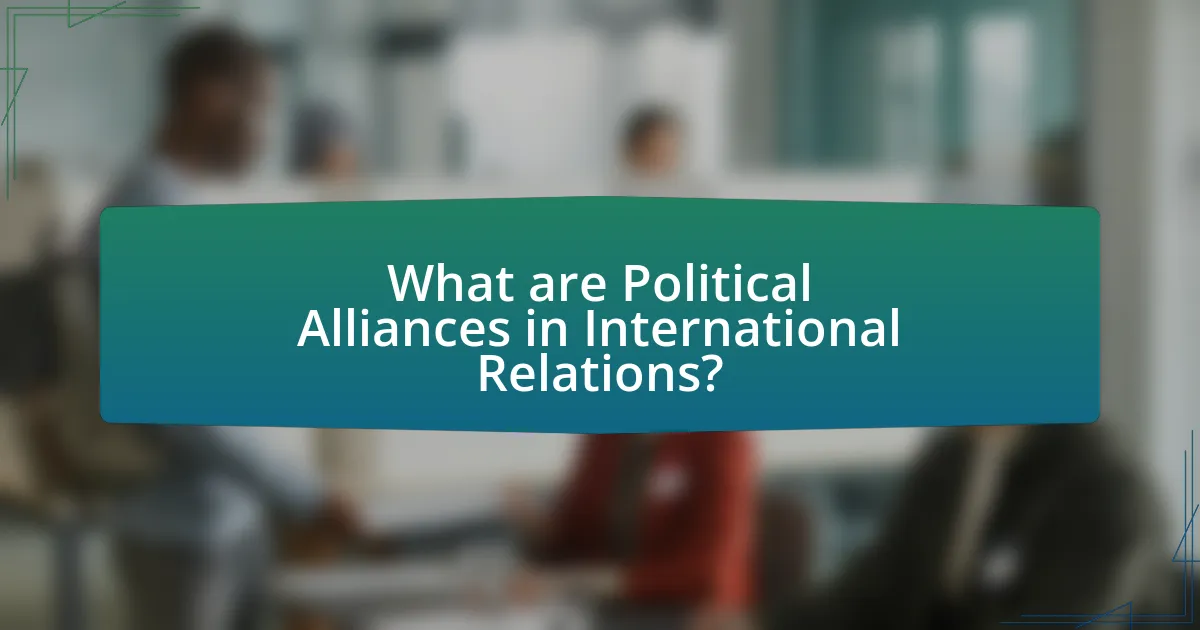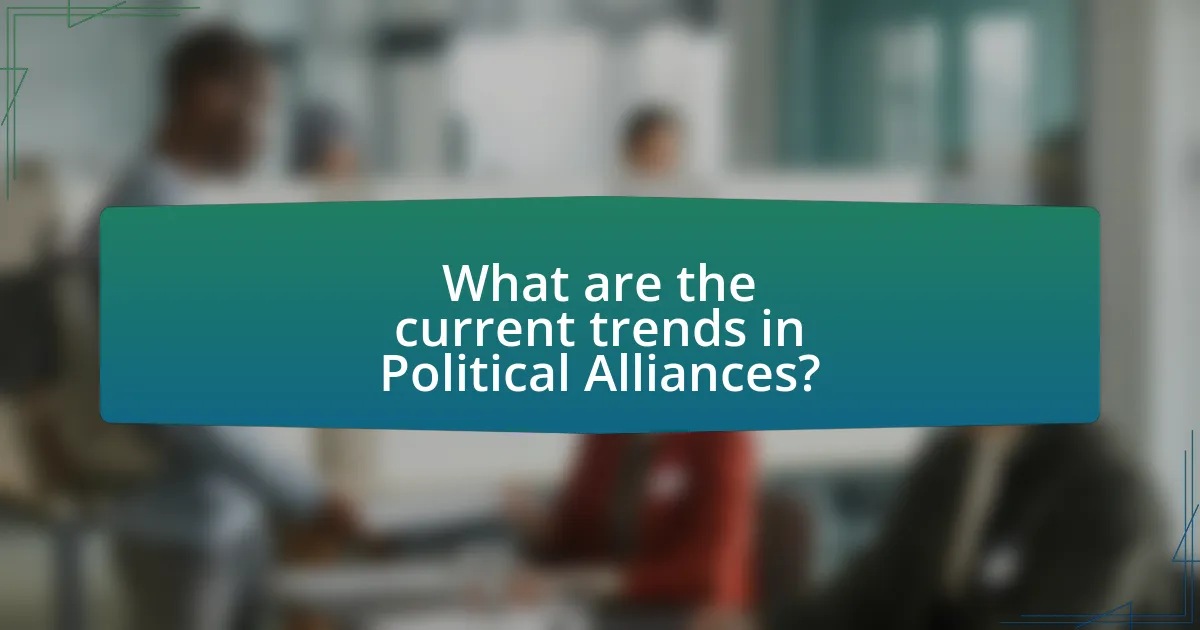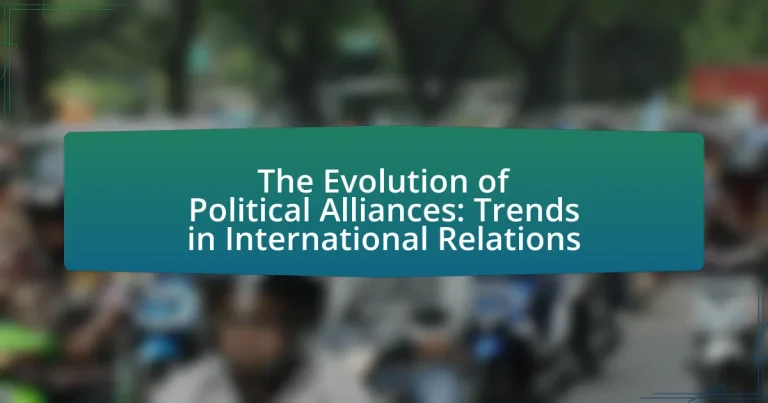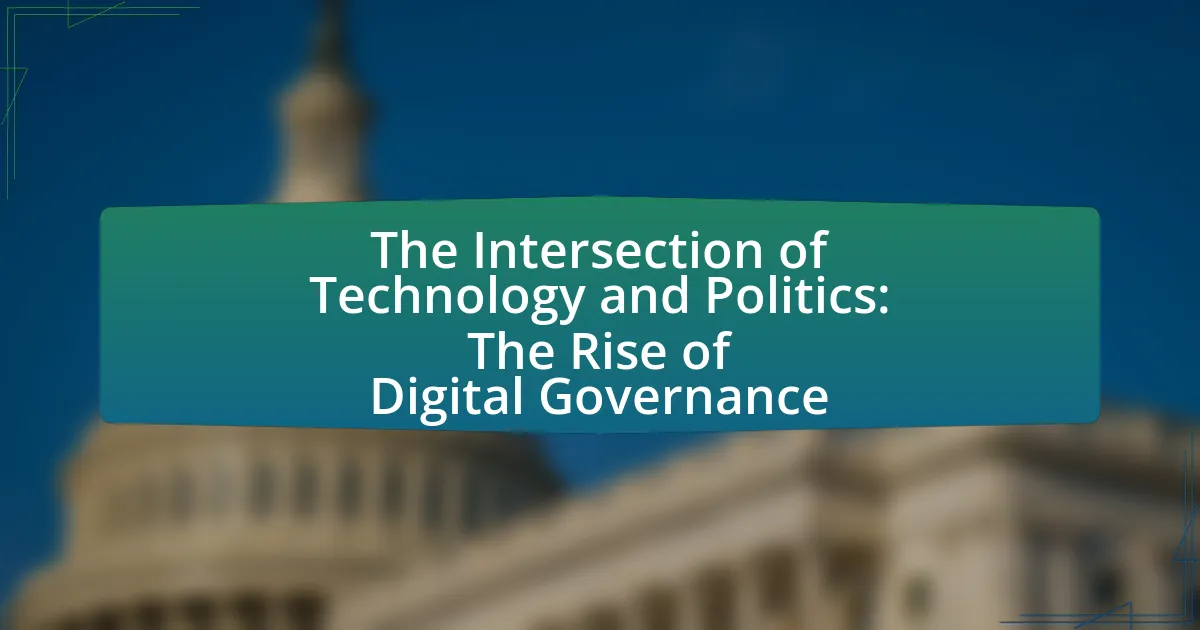Political alliances in international relations are formal agreements between countries aimed at cooperation for mutual defense, economic benefits, or political support. This article explores the evolution of these alliances, tracing their historical development from informal agreements to structured treaties, and examines key events that have shaped their formation, such as the Treaty of Versailles and the establishment of NATO. It also discusses the influence of cultural and ideological factors, the importance of alliances in global politics, and their role in conflict resolution and national security strategies. Current trends, challenges, and future prospects for political alliances are analyzed, highlighting the impact of globalization, economic interdependence, and technological advancements on their dynamics.

What are Political Alliances in International Relations?
Political alliances in international relations are formal agreements between countries to cooperate for specific purposes, such as mutual defense, economic benefits, or political support. These alliances can take various forms, including military alliances like NATO, economic partnerships like the European Union, or diplomatic coalitions like the Non-Aligned Movement. Historical examples, such as the Treaty of Versailles in 1919, illustrate how political alliances can shape global power dynamics and influence international stability. The existence of these alliances often reflects shared interests and strategic goals among member states, impacting global governance and conflict resolution.
How have Political Alliances evolved over time?
Political alliances have evolved significantly over time, transitioning from informal agreements among local leaders to formalized treaties and strategic partnerships among nation-states. Historically, alliances were often based on personal relationships and dynastic ties, such as those seen in medieval Europe, where marriages between royal families solidified political bonds.
In the 20th century, the emergence of global conflicts, such as World War I and World War II, led to the formation of large-scale military alliances like the Allies and the Axis powers, which were driven by mutual defense agreements and collective security principles. The Cold War further transformed political alliances, as ideological divides between capitalism and communism resulted in the establishment of NATO and the Warsaw Pact, emphasizing military cooperation and political solidarity against perceived threats.
In recent decades, political alliances have increasingly focused on economic cooperation and multilateralism, as seen in organizations like the European Union and various trade agreements. These modern alliances prioritize economic interdependence, diplomatic engagement, and addressing global challenges such as climate change and terrorism, reflecting a shift from purely military considerations to a broader understanding of security and cooperation.
The evolution of political alliances illustrates a dynamic interplay between historical context, geopolitical shifts, and changing priorities in international relations.
What historical events have shaped the formation of Political Alliances?
The formation of political alliances has been significantly shaped by events such as the Treaty of Westphalia in 1648, which ended the Thirty Years’ War and established the principles of state sovereignty and non-interference, leading to the modern state system. Additionally, the formation of NATO in 1949 was a direct response to the geopolitical tensions of the Cold War, aimed at collective defense against the Soviet Union. The European Union’s creation in the aftermath of World War II was driven by the need for economic cooperation and political stability to prevent future conflicts in Europe. These events illustrate how wars, treaties, and geopolitical shifts have historically influenced the establishment and evolution of political alliances.
How do cultural and ideological factors influence Political Alliances?
Cultural and ideological factors significantly influence political alliances by shaping the values, beliefs, and interests that unite or divide states. For instance, countries with similar political ideologies, such as democracy or socialism, often form alliances to promote shared goals and counter opposing ideologies, as seen in the Cold War alliances between NATO and the Warsaw Pact. Additionally, cultural ties, such as language, religion, and historical connections, can foster closer relationships, exemplified by the European Union’s emphasis on cultural integration among member states. These factors create a framework for cooperation or conflict, impacting diplomatic strategies and international relations.
Why are Political Alliances important in global politics?
Political alliances are important in global politics because they enhance collective security, facilitate economic cooperation, and amplify diplomatic influence. By forming alliances, countries can deter aggression from adversaries, as seen in NATO’s role in maintaining peace in Europe since its inception in 1949. Additionally, alliances enable member states to pool resources for economic development and trade, exemplified by the European Union’s single market, which has significantly boosted economic growth among its members. Furthermore, political alliances provide a platform for countries to coordinate their foreign policies, increasing their bargaining power in international negotiations, as demonstrated by the G7 and G20 summits where allied nations address global challenges collaboratively.
What roles do Political Alliances play in conflict resolution?
Political alliances play a crucial role in conflict resolution by facilitating dialogue, providing mediation, and enhancing collective security among member states. These alliances, such as NATO or the European Union, often serve as platforms for negotiation, allowing conflicting parties to engage in discussions that may lead to peaceful outcomes. For instance, NATO’s involvement in the Balkans during the 1990s exemplifies how alliances can mediate conflicts and stabilize regions through diplomatic efforts and military presence. Additionally, political alliances can impose sanctions or offer incentives to encourage compliance with peace agreements, thereby reinforcing their role in maintaining stability and preventing future conflicts.
How do Political Alliances affect national security strategies?
Political alliances significantly shape national security strategies by enhancing collective defense capabilities and fostering diplomatic cooperation among member states. For instance, NATO’s principle of collective defense, enshrined in Article 5, obligates member countries to respond to an armed attack against any one of them, thereby deterring potential aggressors and promoting stability in the Euro-Atlantic area. This collective security framework allows nations to pool resources, share intelligence, and coordinate military operations, which can lead to more effective responses to security threats. Historical examples, such as the U.S. and its allies’ coordinated military actions during the Gulf War, illustrate how political alliances can streamline decision-making processes and amplify military effectiveness.

What are the current trends in Political Alliances?
Current trends in political alliances include a shift towards multipolarity, increased regional cooperation, and the rise of issue-based coalitions. Multipolarity is evident as countries like China and India gain influence, challenging the traditional dominance of Western powers. Regional cooperation is exemplified by organizations such as the European Union and ASEAN, which focus on economic integration and collective security. Additionally, issue-based coalitions are forming around specific global challenges, such as climate change and public health, where countries collaborate regardless of traditional alliances. These trends reflect a dynamic landscape in international relations, driven by globalization and the need for collective action on transnational issues.
How has globalization impacted Political Alliances?
Globalization has significantly transformed political alliances by fostering interdependence among nations, leading to the formation of multilateral agreements and coalitions. This shift is evident in the establishment of organizations such as the European Union and the United Nations, which promote cooperation on economic, security, and environmental issues. For instance, the EU’s creation in 1993 exemplifies how countries can unite for shared goals, enhancing political stability and economic collaboration. Additionally, globalization has encouraged countries to align based on common interests, such as trade agreements like NAFTA, which further solidifies political ties. These developments illustrate that globalization not only reshapes the nature of political alliances but also necessitates adaptive strategies to address global challenges collectively.
What are the implications of economic interdependence on Political Alliances?
Economic interdependence significantly influences political alliances by fostering cooperation and reducing the likelihood of conflict among nations. When countries are economically linked through trade, investment, and supply chains, they have a vested interest in maintaining stable relations to protect their mutual economic benefits. For instance, the European Union exemplifies how economic ties can lead to stronger political unity, as member states prioritize collaborative policies to enhance economic growth and stability. Additionally, research by the World Bank indicates that increased trade between nations correlates with a decrease in military conflicts, highlighting that economic interdependence can serve as a deterrent to war. Thus, the implications of economic interdependence on political alliances are profound, as they create incentives for collaboration and peace among nations.
How do technological advancements influence the dynamics of Political Alliances?
Technological advancements significantly influence the dynamics of political alliances by enhancing communication, facilitating information sharing, and enabling real-time decision-making among allied nations. For instance, the rise of digital communication platforms allows for quicker diplomatic negotiations and coordination during crises, as seen in the rapid responses to geopolitical tensions in the 21st century. Additionally, advancements in data analytics and artificial intelligence enable countries to assess threats and opportunities more effectively, leading to more strategic partnerships. The use of social media has also transformed public diplomacy, allowing nations to shape narratives and influence public opinion in allied countries, thereby strengthening or weakening alliances based on perceived mutual interests.
What are the challenges facing Political Alliances today?
Political alliances today face several significant challenges, including ideological divisions, shifting power dynamics, and the rise of populism. Ideological divisions often lead to conflicts within alliances, as member states may prioritize national interests over collective goals. Shifting power dynamics, particularly the emergence of non-Western powers, challenge the traditional dominance of established alliances like NATO and the EU. Additionally, the rise of populism in various countries undermines the stability of political alliances, as populist leaders may reject multilateral agreements and prioritize unilateral actions. These challenges are evident in recent events, such as the Brexit referendum, which highlighted the fragility of European unity, and the increasing tensions within NATO regarding burden-sharing and defense commitments.
How do rising nationalism and populism affect existing Political Alliances?
Rising nationalism and populism significantly disrupt existing political alliances by prioritizing national interests over collective agreements. This shift often leads to the erosion of multilateral cooperation, as countries increasingly adopt unilateral policies that reflect domestic populist sentiments. For instance, the United Kingdom’s Brexit decision in 2016 exemplifies how nationalist movements can lead to the dissolution of long-standing alliances, as the UK opted to leave the European Union, prioritizing national sovereignty over regional integration. Additionally, populist leaders frequently challenge established political norms and institutions, undermining trust and collaboration among allied nations. This trend has been observed in various countries, where populist rhetoric has resulted in strained relationships within organizations like NATO and the EU, as member states grapple with diverging national priorities.
What role does international law play in the stability of Political Alliances?
International law plays a crucial role in the stability of political alliances by providing a framework for cooperation, conflict resolution, and mutual obligations among states. This legal framework helps to establish norms and standards that govern the behavior of states, thereby reducing uncertainty and fostering trust. For instance, treaties such as the North Atlantic Treaty Organization (NATO) agreement outline collective defense commitments, which enhance the reliability of alliances. Furthermore, international law facilitates diplomatic negotiations and dispute resolution mechanisms, such as the International Court of Justice, which can help prevent conflicts that might destabilize alliances. The adherence to international law by member states reinforces their commitment to shared goals and principles, ultimately contributing to the longevity and stability of political alliances.

What are the future prospects for Political Alliances?
The future prospects for political alliances indicate a trend towards increased collaboration driven by global challenges such as climate change, economic instability, and security threats. As nations face transnational issues, alliances are likely to evolve into more flexible coalitions that prioritize shared interests over rigid commitments. For instance, the Paris Agreement showcases how countries can unite for climate action despite differing political ideologies, suggesting that future alliances may focus on specific goals rather than traditional geopolitical blocs. Additionally, the rise of multipolarity in international relations, characterized by the emergence of new powers like India and Brazil, will further reshape alliances, leading to more diverse and adaptive partnerships.
How might emerging powers reshape Political Alliances?
Emerging powers can reshape political alliances by introducing new dynamics that prioritize multipolarity and regional cooperation over traditional Western-centric frameworks. For instance, countries like India and Brazil have increasingly formed coalitions such as BRICS, which challenge the dominance of established powers and promote alternative governance models. This shift is evidenced by the growing influence of these nations in international organizations, where they advocate for reforms that reflect their interests and those of the Global South, thereby altering the balance of power in global politics.
What potential new alliances could emerge in the next decade?
Potential new alliances that could emerge in the next decade include partnerships among countries in the Global South, particularly in Africa and Latin America, as they seek to enhance economic cooperation and political influence. For instance, the African Continental Free Trade Area (AfCFTA) aims to create a single market for goods and services across 54 countries, fostering regional collaboration. Additionally, the rise of multipolarity may lead to alliances between nations like India, Brazil, and South Africa, focusing on shared interests in trade, climate change, and security. These developments reflect a shift towards more inclusive and diverse geopolitical dynamics, as emerging economies seek to assert their roles on the global stage.
How can existing alliances adapt to changing global dynamics?
Existing alliances can adapt to changing global dynamics by enhancing flexibility in their strategic objectives and fostering inclusive dialogue among member states. This adaptability is crucial as geopolitical shifts, such as the rise of new powers and evolving security threats, necessitate a reevaluation of collective priorities. For instance, NATO has adjusted its focus from traditional territorial defense to addressing cyber threats and terrorism, reflecting the changing nature of security challenges. Additionally, alliances can implement regular assessments of their goals and member contributions, ensuring alignment with current global realities. This approach is supported by the fact that successful alliances, like the European Union, have thrived by incorporating diverse perspectives and responding to economic and political changes, thereby maintaining relevance in a dynamic international landscape.
What best practices can enhance the effectiveness of Political Alliances?
Effective political alliances can be enhanced through clear communication, mutual respect, and shared goals. Clear communication ensures that all parties understand each other’s objectives and concerns, which fosters trust and collaboration. Mutual respect among alliance members promotes a positive working relationship, allowing for diverse perspectives to be valued and integrated into decision-making processes. Shared goals align the interests of the members, creating a unified direction that strengthens the alliance’s overall effectiveness. Historical examples, such as NATO’s collective defense principle, demonstrate that these practices lead to successful cooperation and resilience in addressing common challenges.
How can member states improve communication and collaboration within alliances?
Member states can improve communication and collaboration within alliances by establishing regular, structured dialogue mechanisms and joint training exercises. These initiatives foster trust and understanding among member states, which is essential for effective collaboration. For instance, NATO conducts regular joint military exercises to enhance interoperability and communication among its members, demonstrating the effectiveness of such collaborative efforts. Additionally, utilizing digital communication platforms can facilitate real-time information sharing, further strengthening ties and responsiveness among member states.
What strategies can be employed to strengthen the resilience of Political Alliances?
To strengthen the resilience of political alliances, fostering open communication and trust among member states is essential. Open communication allows for the timely sharing of information and concerns, which can prevent misunderstandings and conflicts. Trust is built through consistent collaboration on shared goals, as seen in the North Atlantic Treaty Organization (NATO), where member states engage in joint military exercises to enhance cooperation and solidarity. Additionally, establishing flexible frameworks for decision-making can help alliances adapt to changing geopolitical landscapes, as demonstrated by the European Union’s ability to navigate economic crises through collective action. These strategies, supported by historical examples, illustrate effective methods for enhancing the durability and effectiveness of political alliances.




